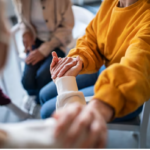


Providence caregivers and Work2BeWell National Student Advisory Council (NSAC) Alumni recently shared their thoughts about the unique mental health challenges that minorities face as well as ways to improve mental health for minorities.
Pictured from left: Ash Franco-Carreno, NSAC Alum, Brandy Jones, senior patient services specialist at Swedish Heart and Vascular Institute; and Kianna Victor, NSAC Alum.
As we observe Minority Mental Health Awareness Month throughout July, Providence’s Well Being Trust is recognizing the unique mental health challenges that minorities face and uplifting the diverse voices throughout Providence.
More than one in five U.S. adults from all backgrounds experience a mental illness, but ethnic and racial minorities often encounter more stigma and difficulties accessing care and substance abuse treatment. Some barriers to care include high costs and lack of health insurance. American Indian and Alaska Native Americans had the highest uninsured rate — 18.8% — in 2021, followed by Hispanic or Latino Americans at 17.7%, while White Americans had the lowest rate at 5.7%.
Ethnic and racial minorities often encounter more stigma and difficulties accessing care and substance abuse treatment.
Language differences and a lack of access to culturally competent mental health care providers that understand their patients’ experiences are among other barriers. The American Psychological Association found that 86% of psychologists were white in a 2015 study. Yet, patients often feel more comfortable and receive better care and more accurate diagnoses when treated by providers that look like them.
Black, Latino, Indigenous, Asian and Pacific Islander and other people of color also disproportionately experience social and environmental stressors such poverty, racism and racial violence that increase their risk for mental health conditions. Black and Latino Americans who experience mental health and substance use disorders are also more likely to be incarcerated and to experience homelessness, rather than receiving care, treatment and support.
As we continue working toward more equitable mental health care for all, we asked Providence caregivers from our Asian American and Pacific Islander, Black, and Hispanic Caregiver Resource Groups and Work2BeWell National Student Advisory Council (NSAC) alumni to share their experiences and thoughts on minority mental health.
Different Cultures, Similar Struggles
Despite coming from different ethnic backgrounds, caregivers shared many shared similar challenges, such as high costs of therapy and access to providers who understand their experiences and culture.
“One challenge I have faced as a person of color is growing up my whole life being conscious of the people around me and how they might feel differently about my presence,” said Ash Franco-Carreno, a NSAC alum. “Getting dirty looks and hearing negative comments, made me feel bad about myself solely because of my skin tone. This is such a damaging experience for a child. We need to focus on youth mental health in people of color for the sake of keeping our kids safe and alive – kids of all backgrounds and minorities.”
One Providence caregiver shared that she could not find Asian American or BIPOC (Black, Indigenous, People of Color) therapists.
“I was desperately in need of someone who understood my culture and the ideals of being second generation Filipino American. It was very hard to open up to someone who did not understand the immigrant mentality that my parents had, which affected my upbringing.”
Kianna Victor, a NSAC alumn, mentioned how even when she sought help, it was difficult to find the right resources that were culturally relevant.
“There is a lack of access to and awareness of BIPOC mental health resources,” said Victor. “This is because of the intergenerational stigma in marginalized communities. Whether due to religious beliefs, cultural practice or simply access to treatment, the BIPOC community is not readily seeking mental health resources compared to other populations.”
Stigma, A ‘Silent Struggle’
When we asked about their top concerns, many shared that stigma has caused them not to talk about their mental health or seek help, referring to it as a “silent struggle.”
“We must erase the stigma, so people know that seeking help is not a bad thing, but a healthy thing to do,” said Joanne Guanzon Moore, finance manager at Providence Clinical Network.
Others mentioned how they never learned how to ask for help because of the deeply ingrained mental health stigmas in their family.
Joanne added, “They still think treating mental illness is negative and will look at the person seeking help as a failure.”
What Can We Do?
“We need education at all generational levels and must encourage that information through storytelling that can be shared and passed down."
We asked our caregivers what they think needs to be done in the U.S. to improve minority mental health. Answers varied — some mentioned lowering the cost of therapy, erasing stigma, having more diverse health care providers, and increasing education and awareness.
“We need education at all generational levels and must encourage that information through storytelling that can be shared and passed down,” said Larissa Aaberg, principal talent management consultant based in Anchorage, Alaska.
Our caregivers and student advocates also let us know how they manage their mental health and well-being. Many said they’re still looking for a therapist that understands their experiences. In the meantime, they’re actively trying to prioritize self-care.
Debra Farr, pharmacy manager at Providence Medical Group in Oregon, shared that she cares for her mental health by exercising and participating in mindfulness activities.
“I like to pamper myself with my favorite foods, sightseeing, reading and massages,” said Brandy Jones, senior patient services specialist at Swedish Heart and Vascular Institute. “I hope we all are doing something amazing for ourselves.”
Providence’s Well Being Trust is grateful for the openness of the diverse workforce throughout Providence and young adult advocates who shared their experiences.
Mental Health Resources for Minority Populations
If you or someone you know is struggling with a mental health or addiction issue, we want you to know that you are not alone. View this list of mental health resources that support minority populations.
If you are experiencing a mental health crisis, call or text 988. Click here to learn more about the 988 Suicide and Crisis Lifeline.





